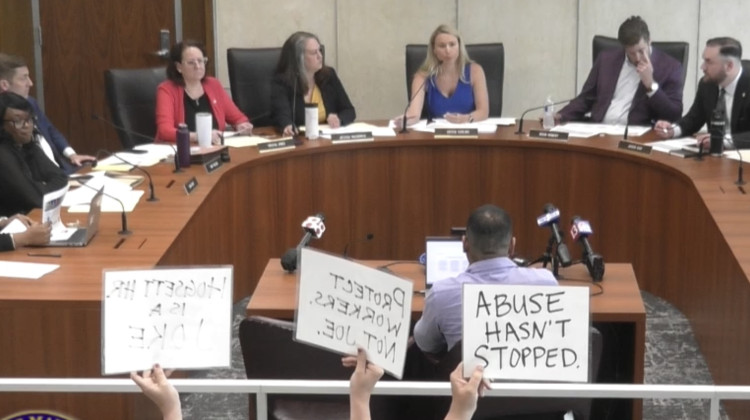People who knowingly give firearms to felons or someone otherwise ineligible to own guns would face penalties under a bill under consideration in the Senate Corrections and Criminal Law Committee.
Senate Bill 169 makes the offense a Level 4 or 5 felony (which would be a C felony under the previous system). It also increases it to a Level 2 (previously a B) if that firearm is used in a murder.
Last year the General Assembly established a six-tier felony system – with Level 1 being the highest – to replace the current A-D felony system.
Under current law, it is illegal to take money from a felon and purchase a firearm for them. However, it’s legal for someone to give or sell a firearm he or she already owns to a felon. Sens. Michael Young, R-Indianapolis, and Jim Merritt, R-Indianapolis, who co-authored the bill, said they hope SB 169 would clear up the loopholes.
“We’re tired of people getting killed with illegal handguns,” Young said. “I’m tired of police officers who put their lives on the line and die because somebody shouldn’t have a gun and someone gave it to them or sold it to them, and I want it to stop. The best way I can get it to stop is to send this message: if you give somebody a gun, and somebody dies because of it, you’re going to be held to a higher standard.”
Merritt described stories on the news and in the newspapers about homicides and home invasions in Indianapolis.
“Many of my constituents just don’t feel safe in their homes,” Merritt said. “I have a constituent who actually answers the door during the day with a firearm pointed to the ceiling because they don’t know who’s on the other side of the door. They don’t feel safe in their own home.”
But Sen. Gregory Taylor, D-Indianapolis, passionately opposed SB 169. He is the author of a second chance bill to help felons have their crimes expunged. He said he disagrees with the idea of holding a third party accountable for “the actions of someone else and spend 20 years in prison because of reasonable cause.”
The bill uses the term “reasonable cause” to determine who could be charged for selling or giving a gun to a felon. The term is already defined in law. It means one may not have actual knowledge of a crime but could have enough reasonable knowledge to know it might occur.
Troy Riggs, the director of public safety in Indianapolis, provided the city’s crime statistics to help support the bill. He said that in the past two years, there have been 221 homicides in Indianapolis, with 80 percent of those committed with guns. In the same time period, there have been 759 non-fatal shootings and “the only difference between the gun-related homicides and the non fatal shootings is where it landed. I think it’s safe to assume for each of those 936 shootings, the intent was always the same,” Riggs said.
“I don’t think we can put a value on human life,” Riggs said.
An amendment to SB169 would also increase the sentencing of felony charges from five years to 10 or 20.
“This piece of legislation I believe sends a message to those criminals that we’re cracking down,” Merritt said. “I get a little excited about this because when you have constituents that actually contact you saying they’re scared to be in their own home during the day, we’ve got a problem.”
But Taylor believes it is a jail problem, not a sentencing problem.
“What I find interesting about your proposal is that what you want to do to curb the fact that these people are committing crimes is increase their time in prison,” Taylor said. “It just seems to me that their time in prison has not rehabilitated them. They haven’t been rehabilitating if they’re getting out there committing more crimes. So you’re enhancement to me doesn’t seem like a reasonable solution, in my opinion.”
Taylor said he was angry no one has contacted him about SB169. He said his area has “more of these problems than anyone’s who is authoring this bill” and he has ideas to offer.
“I want to be a part of this discussion because I have some solutions, too,” Taylor said. “This is not partisan; this is not political. This is about human beings.”
Young chose to hold the bill to clean up the language.
Danielle Faczan is a reporter for TheStatehouseFile.com, a news website powered by Franklin College journalism students.
 DONATE
DONATE







 Support WFYI. We can't do it without you.
Support WFYI. We can't do it without you.